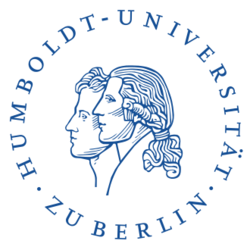Humboldt University of Berlin
(University) | |
|---|---|
 | |
| Formation | 1810 |
| Headquarters | Berlin |
| Sponsored by | Mercator Foundation |
| Experienced several drastic changes during the last century. | |
Humboldt University of Berlinis a public research university in central Berlin, Germany. It has experienced two drastic changes: in the years after the Second World War, when was split and the main part belonged to East Germany, and again after 1990 after the German reunification, when it experienced a drastic purge of staff.
History
It was established by Frederick William III on the initiative of Wilhelm von Humboldt, Johann Gottlieb Fichte and Friedrich Ernst Daniel Schleiermacher as opened in 1810,[1] making it the oldest of Berlin's four universities. From 1810 until its closure in 1945, it was named Friedrich Wilhelm University.[2]
It was regarded as the world's preeminent university for the natural sciences during the 19th and early 20th century, as the university is linked to major breakthroughs in physics and other sciences by its professors, such as Albert Einstein.[3] Past and present faculty and notable alumni include 57 Nobel Prize laureates (the most of any German university by a substantial margin), as well as eminent philosophers, sociologists, artists, lawyers, politicians, mathematicians, scientists, and Heads of State; among them are Albert Einstein, Karl Marx, Friedrich Engels, Otto von Bismarck, W. E. B. Du Bois, Angela Davis, Arthur Schopenhauer, Georg Wilhelm Friedrich Hegel, Walter Benjamin, Max Weber, Georg Simmel, Karl Liebknecht, Ernst Cassirer, Heinrich Heine, Max Planck and the Brothers Grimm.
During the Cold War the university found itself in East Berlin and was de facto split in two when the Free University of Berlin opened in West Berlin, and retaining traditions and faculty members of the old Friedrich Wilhelm University. The name of the Free University refers to West Berlin's perceived status as part of the Western "free world," in contrast to the "unfree" Communist world in general and the "unfree" communist-controlled university in East Berlin in particular.[4]The eastern part of university received its current name in honour of Alexander and Wilhelm von Humboldt in 1949.[5]
After the German reunification, the university was radically restructured under the Structure and Appointment Commissions, which were presided by West German professors.[6][7]For departments on social sciences and humanities, the faculty was subjected to a "liquidation" process, in which contracts of employees were terminated and positions were made open to new academics, mainly West Germans. As a result, only 10% of the mid-level academics in Humboldt University still had a position in 1998.[7]
Because of the sudden change in direction after 1945 and again in 1990, the alumni from are from mixed traditions.
Sponsor
| Event | Description |
|---|---|
| Mercator Foundation | German foundation financing projects of deep state interest and buying control over the narrative, especially on "climate change" and pro-migration. Frequently connected to censorship initiatives. |
Alumni on Wikispooks
| Person | Born | Died | Nationality | Summary | Description |
|---|---|---|---|---|---|
| Theodor Benzinger | 23 August 1905 | 26 October 1999 | US German | Researcher | |
| Otto von Bismarck | 1 April 1815 | 30 July 1898 | Deep politician | ||
| Nejat Eczacıbaşı | 5 January 1913 | 6 October 1993 | Turkey | Chemist Deep state operative Businessperson | Triple Bilderberger Turkish businessman who co-founded Turkish Industrialists' and Businessmen's Association |
| Friedrich Engels | 28 November 1820 | 5 August 1895 | German | Author Socialism | |
| Richard Jaeger | 16 February 1913 | 15 May 1998 | German | Politician | German politician |
| Hans Jonas | 10 May 1903 | 5 February 1993 | US German | Philosopher | German-born American Jewish philosopher |
| Michael Josselson | 2 March 1908 | 7 January 1978 | US | Spook Polyglot | CIA agent who set up the Congress for Cultural Freedom in 1950. |
| Otto Kersten | 1928 | 1982 | German | General Secretary of the International Confederation of Free Trade Unions who attended two Bilderberg meetings in the 1970s. | |
| Kurt Lewin | 12 February 1947 | Described "groupthink". | |||
| Richard Löwenthal | 15 April 1908 | 9 August 1991 | German | Journalist Academic Deep state operative | A Jewish exile from Nazi Germany, he soon was attached to US and UK intelligence services. After the war became a major intellectual in the Social Democratic Party of Germany, and often consulted by the SPD’s leaders, especially Willy Brandt and Ernst Reuter. He attended the 1968 Bilderberg conference. |
| Selim Sarper | 14 June 1899 | 11 October 1968 | Turkey | Diplomat Politician | Attended the 1959 Bilderberg in Turkey. Became Turkish Minister of Foreign Affairs on the day after the 1960 Turkish coup d'état |
| Shepard Stone | 31 March 1908 | 4 May 1990 | US | Spook Propagandist | New York Times propagandist and Bilderberg Steering committee member who was Director of International Affairs of the Ford Foundation for 15 years. |
| Jona von Ustinov | 2 December 1892 | 1 December 1962 | German | Spook |
References
- ↑ https://www.hu-berlin.de/de/ueberblick/geschichte%7Cpublisher=Humboldt-Universität zu Berlin
- ↑ https://www.britannica.com/topic/Humboldt-University-of-Berlin
- ↑ Hans C. Ohanian, Einstein's Mistakes: The Human Failings of Genius, p. 156, W. W. Norton & Company, 2009, ISBN 9780393070422
- ↑ http://worldcat.org/oclc/893685205
- ↑ https://www.dw.com/en/berlins-oldest-university-faces-new-challenges-as-it-turns-200/a-6106014
- ↑ https://www.hu-berlin.de/en/about/history/huben_html#reopen
- ↑ a b Boesch, Frank (2018). A History Shared and Divided: East and West Germany since the 1970s. Berghahn Books. p. 419.